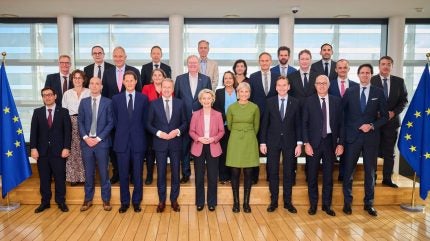
Representatives of Europe’s auto industry have met with EU Commission President Ursula von der Leyen in the framework of the ‘third Strategic Dialogue’, launched eight months ago to address the mounting crisis in a sector vital to the European economy.

Discover B2B Marketing That Performs
Combine business intelligence and editorial excellence to reach engaged professionals across 36 leading media platforms.
The latest meeting comes as European automakers have called for a re-evaluation of the European Union’s stringent climate regulations, asserting that the current trajectory towards banning combustion engines on new vehicles for sale (including a 100% reduction for cars by 2035) is ‘unfeasible’.
Europe’s auto industry is also grappling with the dual challenges posed by rising competition from China in the electric vehicle (EV) market and higher tariffs on shipments to the US.
ACEA said last month in a letter to the EU Commission: ‘Europe’s transformation plan for the auto industry must move beyond idealism to acknowledge current industrial and geopolitical realities. Meeting the rigid car and van CO2 targets for 2030 and 2035 is, in today’s world, simply no longer feasible.’
In the latest meeting, there was limited sign of any concessions to the industry from Brussels.
The automakers’ trade association ACEA said it welcomes the clear focus of ‘today’s third Strategic Dialogue on the Future of the European Automotive Industry on the structural challenges facing both the sector and Europe as a whole’.
“We agree with the Commission President that bold and fast action is required”, stated Ola Källenius, ACEA President and CEO of Mercedes-Benz. “No one has more at stake in the success of zero-emission mobility than Europe’s automakers. A thriving Europe needs us, and we need a thriving Europe.”
ACEA said that ‘most urgently’, concrete steps are needed to make the CO2 policy framework for cars and vans fit for reality. “We are in this open and constructive dialogue to find a better way to green”, said Källenius. “We may not have cleared all differences yet, nor have the answers to all challenges. But we are positive to see the solution space is broadening, and confident the work of the next months will yield results. Europe simply has to deliver on all accounts: decarbonisation, competitiveness and supply chain resilience.”
There was a harder and more direct message from European suppliers organisation CLEPA, which urged a ‘technology-neutral strategy’. It said that focusing solely on electric-only solutions risks ‘sidelining the flexible, climate-neutral technology portfolio where Europe already leads globally.’
Matthias Zink, CLEPA President said: “We must keep ambitious climate goals but build the path together. A substantial and timely revision of the CO₂ regulation, true openness to all climate-neutral technologies – including a freeze of the utility factor for plug-in hybrids – and decisive steps toward a realistic regulatory framework that supports a role for hybrids, range extenders, hydrogen, renewable fuels are essential.”
CLEPA said that according to its figures, automotive suppliers face a 15–35% cost disadvantage compared to global competitors, driven by high energy and labour costs, regulatory burdens, and fragmented EU frameworks. Supplier companies are also experiencing severe job losses: more than 54,000 job losses were announced in 2024, with a further 22,000 already foreseen this year, as factory closures and stalled investments take their toll.
“Truck and bus makers are committed to Europe’s green transition: the vehicles are ready, but the enabling conditions are not” stated Christian Levin, CEO of Traton Group and Scania.
Industry leaders argue that the EU cannot afford to wait until 2027 to review CO2 standards for heavy-duty vehicles. Instead, urgent monitoring and action are needed to put road freight on track for climate neutrality.
In the margins of the Dialogue, a Memorandum of Understanding was signed between the Commission and key stakeholders to promote synergies between different innovation programmes. ACEA said it welcomes the intent to develop a Joint Undertaking for Automotive Research and Innovation, and stresses the importance of direct company involvement in the creation and steering of this Joint Undertaking from the beginning.
A next meeting of the Strategic Dialogue is expected by December.






